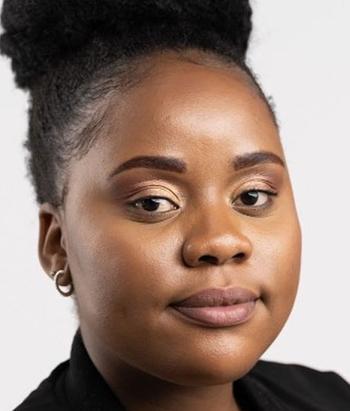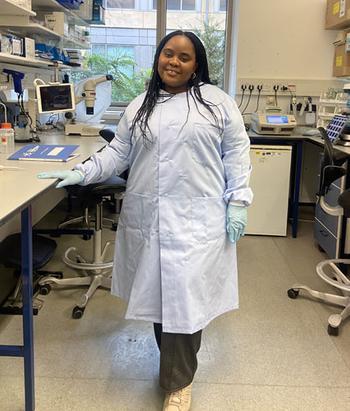Black History Month: Onalenna Neo
Posted on October 1, 2025 by Microbiology Society
Celebrated annually during the month of October in the UK, Black History Month recognises the contributions, culture and history of Black people. This year, we spoke to Onalenna Neo, a Postdoctoral Research Fellow at the Wellcome Sanger Institute, UK, who shared her experiences as a Black scientist and reflected on the vital role of Black representation and visibility in the science.

Could you tell us about yourself?
I’m a Sanger Excellence Postdoctoral Research Fellow at the Wellcome Sanger Institute, in Cambridge, UK. My work is in microbial genomics, and I’m especially interested in how antimicrobial resistance emerges and spreads in complex environments. Antibiotic resistance is one of the greatest health challenges we face globally, and I feel very fortunate to be part of a community that is trying to understand it and ultimately help tackle it.
It’s Black History Month throughout October; will you be doing anything to raise awareness or celebrate?
For me, Black History Month is a time to reflect, celebrate and amplify the voices and contributions of Black people, past and present. Taking part in this interview is part of that, and I also make a point of engaging with events and discussions both at the Sanger Institute and in the wider scientific community. It’s important to acknowledge those who paved the way, while also celebrating the achievements of today’s Black scientists.
The theme of this year’s awareness month is ‘Standing Firm in Power and Pride’ which aims to celebrate the strength, resilience and achievements of Black communities, whilst also looking towards a future of empowerment and progress. Is this something that resonates with you and if so, how?
It resonates deeply. To me, it’s about being unapologetically yourself in spaces where you may not always see many people like you. As a Black scientist, I know what it feels like to be underrepresented and standing firm in power and pride is a way of saying: I belong here, my work matters and my story has value. It’s also about making sure the door stays open for those who come after us.
When and why did you first become interested in microbiology?
My first encounter with microbiology was at university. I had enrolled in Cellular and Molecular Medicine as a route to graduate medicine, but then one of my lecturers gave a talk on how bacteria develop resistance to antibiotics. I was captivated. The idea that something so small could evolve such clever strategies to survive was fascinating. That lecture completely changed the course of my career. It was the moment I realised microbiology was something I wanted to pursue more deeply.

If you hadn’t gone into science, what career path would you have chosen?
I’ve always loved languages, creative writing and exploring the human mind. If I hadn’t gone into science, I think I would have chosen psychology and writing, perhaps even found a way to combine them. For me, science and writing have a lot in common: both are about curiosity, making sense of the world and telling stories that matter.
As a Black person working in microbiology in the UK, have you faced any challenges because of your background?
Yes, there have been challenges. As an immigrant, visas are always in the background, whether it’s for travelling to conferences or applying for positions, there are doors that don’t open unless you have visa sponsorship. That uncertainty can be disheartening.
As a Black scientist, the lack of representation is something I’ve felt strongly. At times it can feel lonely, like you’re navigating without a map. Breaking glass ceilings is exciting, but it also comes with responsibility and sometimes little guidance or reward. It can feel heavy, but I always remind myself that being visible matters. If my presence makes it easier for someone else to see themselves in this space, then that weight is worth carrying.
Is there any advice that you would give to other Black people who are working (or hoping to work) in science?
Find mentors who believe in you and build a community around you. Having people in your corner who genuinely want to see you succeed makes all the difference. Science can sometimes feel isolating, but the right network can carry you through those moments.
And most importantly don’t shrink yourself. Your background, your perspective, your story all bring something valuable to science. Even when the path feels uncertain, you belong here.
Do you have any role models, if so, who?
Yes, I’ve been lucky to have supervisors and mentors, during my PhD and currently in my postdoc, who really believe in me. Sometimes just knowing that someone else has confidence in you is enough to give you the courage to push forward.
I also look up to scientists like Dr. Claire Chewapreecha, whose work on Burkholderia is extraordinary. And I’m deeply inspired by Black women like Professor Iruka Okeke, who has made incredible contributions to microbiology in Nigeria while also investing so much in the next generation of scientists. She shows that excellence in science can go hand in hand with mentorship and community, which is something I aspire to myself.
Are there any Black scientists from history that have inspired you?
Yes, I am especially inspired by Roger Arliner Young. She was the first Black woman in the US to earn a PhD in Zoology, and her work in marine biology was groundbreaking. But what moves me most is her story of resilience. Despite poverty, racism, sexism and a system that too often failed her, she still carved out space for herself in science and produced work of real significance.
Her journey reminds me that brilliance is not always met with recognition, and that the path for Black scientists has rarely been smooth. Yet, she persisted. That perseverance, that refusal to give up, is powerful. For me, her story is both a warning, of how much talent can be lost when systems aren’t fair and an inspiration to keep going, knowing that every step we take makes the way clearer for those who follow.
You currently sit on the Society’s Members Panel and Scientific Conferences Panel, what made you decide to get involved in the Society’s governance?
For me, it was about representation and contribution. I wanted to bring forward ideas that could improve the experience of Black members, international members, women and other groups that are still underrepresented.
I also believe that presence is power. Being in the room, part of the discussion, is worthwhile for my own growth, but it also means I can help ensure my community is represented. Governance gives me the chance to help shape spaces that are more inclusive and welcoming, while also learning from others. It’s both personally enriching and, I hope, impactful for those who come after me.
Find out more about the Society’s equality, diversity and inclusion initiatives.
